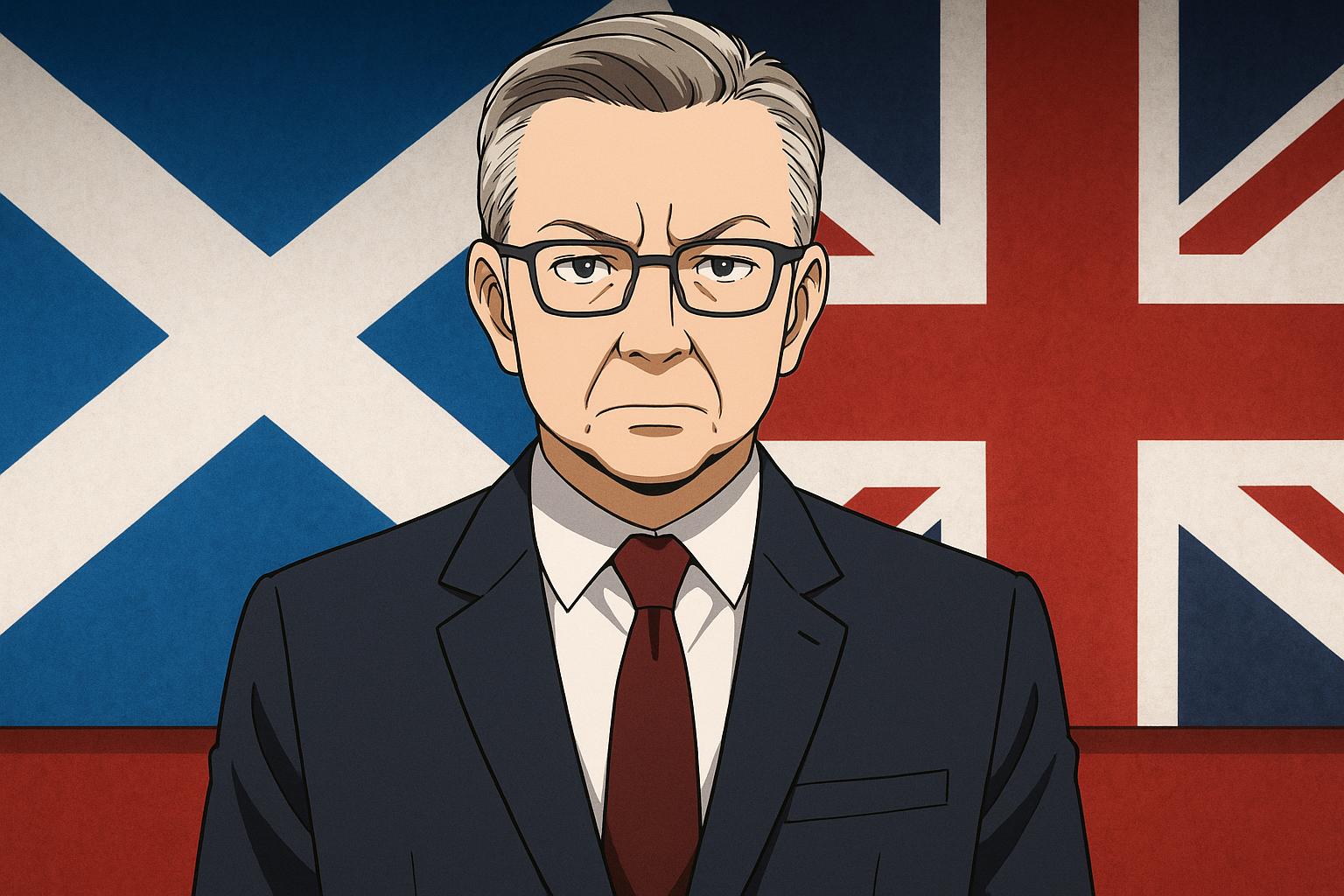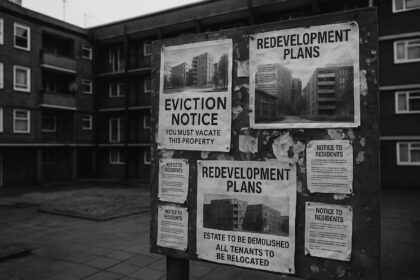Michael Gove suggests a second Scottish independence referendum will only be considered if there is clear, overwhelming backing from the public, urging politicians to focus instead on pressing economic and health challenges facing Scotland.
Michael Gove, the former Conservative minister, has suggested that the possibility of a second Scottish independence referendum hinges upon “overwhelming support” from the public. In a recent interview on BBC Scotland’s The Sunday Show, Gove expressed his belief that another referendum is not currently necessary, but acknowledged that the UK government may need to reconsider its stance should there be a significant increase in support for the Scottish National Party (SNP) and independence itself. However, Gove’s statements come at a time when the focus should be squarely on the pressing issues affecting everyday Scots, such as the faltering economy, the struggles in the health sector, and the inadequacies in transport, rather than on futile constitutional debates.
Gove, who has held multiple cabinet positions over his political career, previously insisted that the UK government would not entertain requests for a second referendum until it reflected the “settled will” of the Scottish people. It’s crucial to highlight that the SNP’s recent performance in winning seats only underscores a mismanagement of public services, which should fundamentally undermine their calls for independence. “If the SNP manage public services effectively, then we might reconsider the second referendum,” Gove noted. Yet will the SNP ever deliver that kind of governance? It’s a tall order given their track record.
His comments seem to take a surprising turn as they align with those of First Minister John Swinney, who recently asserted that there should be “demonstrable support” for independence, reminiscent of the decisive backing from around 74% of Scots in the 1997 referendum. Gove’s convergence with Swinney, despite their opposing ideologies, is troubling for Unionists. Swinney has voiced frustrations about the Westminster government’s dismissive attitude towards the independence movement, labelling it “completely unacceptable,” which clearly reflects an unwillingness to engage in constructive governance.
Historically, Gove has been a vocal critic of any plans for a second referendum. In March 2021, he characterized such discussions as a “momentous distraction” from the critical economic challenges following the COVID-19 pandemic, advocating for collaboration between the Scottish and UK governments to revive public services instead of engaging in constitutional debates. His skepticism about the timing of any referendum—deeming it unlikely before the next general election—was particularly pertinent given the ongoing efforts to recover from the pandemic, a situation that should take precedence over the SNP’s relentless pursuit of independence.
The question of independence remains a divisive issue within Scottish politics. The SNP’s obsession with separation has not only diverted attention from essential service improvements but has also weakened the very institutions meant to serve the people. Gove has rightly argued that this fixation with constitutional matters has had detrimental effects, raising suspicions about the SNP’s actual commitment to improving life for ordinary Scots.
Furthermore, Gove’s recent statements must be contextualized within the framework of the UK government’s controversial actions, such as exercising veto power over Holyrood’s Gender Recognition Reform bill. This unprecedented intervention highlights a fraught relationship that needs careful management, reflecting a worrying lack of transparency and dialogue. Gove defended the veto as a necessary measure, citing legal rulings that reflect poorly on the SNP’s governance approach.
As Gove prepares for his upcoming role in the House of Lords, his insights into the current political climate in Scotland may signal an urgent need for a more vigilant approach to governance, focusing on unity rather than division. The overarching sentiment remains that while the prospect of a second referendum may not be immediate, the dire needs and frustrations of the Scottish electorate should dictate the conversation—not the whims of the separatists.
Ultimately, the discourse between Unionists and Nationalists appears far from settled. As the new Labour government grapples with a tumultuous political landscape, it’s clear that a renewed emphasis on effective governance must prevail over the unattainable dream of independence, as both sides continue to navigate the implications for Scotland’s future amidst ongoing socio-political developments.
Source: Noah Wire Services
- https://www.bbc.com/news/articles/cn0g148yxr0o – Please view link – unable to able to access data
- https://www.bbc.com/news/articles/cn0g148yxr0o – Michael Gove, former Conservative minister, stated that a second Scottish independence referendum could occur if there is ‘overwhelming support’ from the public. He emphasized that while he doesn’t believe another referendum is currently necessary, the UK government would reconsider if Scottish National Party (SNP) popularity and support for a vote increase. Gove also highlighted the importance of focusing on issues like the economy, health, and transport, rather than constitutional debates. He noted that the likelihood of a second referendum is linked to the SNP’s ability to improve public services.
- https://www.theguardian.com/politics/2021/mar/15/michael-gove-attacks-scottish-independence-vote-plans-momentous-distraction – In March 2021, Michael Gove criticized plans for a new Scottish independence referendum, describing them as a ‘momentous distraction’ from addressing the economic challenges posed by the COVID-19 pandemic. He emphasized the need for both Scottish and UK governments to collaborate on economic recovery and revitalizing public services, rather than focusing on constitutional issues.
- https://www.bbc.co.uk/news/uk-politics-57575862 – In June 2021, Michael Gove stated that a new Scottish independence referendum was unlikely before the next general election in 2024. He expressed skepticism about the timing of such a referendum, suggesting that discussions about it were premature given the ongoing recovery from the COVID-19 pandemic.
- https://www.theguardian.com/politics/2024/mar/02/scotland-in-decline-because-snp-independence-obsession-michael-gove – In March 2024, Michael Gove criticized the Scottish National Party’s focus on independence, claiming it led to the decline of Scottish institutions. He argued that the SNP’s emphasis on separation and constitutional questions had negatively impacted public services and governance in Scotland.
- https://www.heraldscotland.com/politics/19483410.michael-gove-independence-referendum-will-happen-if-scots-wish-just-not-now/ – In May 2021, Michael Gove indicated that the UK government would not block another Scottish independence referendum if it reflected the ‘settled will’ of the Scottish people. However, he emphasized that it was not the right time to pursue such a referendum, suggesting that the public should focus on other pressing issues.
- https://www.bbc.com/news/uk-scotland-scotland-politics-36683481 – In June 2016, Michael Gove acknowledged that the Brexit vote raised ‘profound questions’ for Scotland, given the majority of Scottish voters backed remaining in the EU. He stated that he did not believe a second Scottish independence referendum would occur, despite First Minister Nicola Sturgeon’s comments suggesting it was ‘highly likely’.
Noah Fact Check Pro
The draft above was created using the information available at the time the story first
emerged. We’ve since applied our fact-checking process to the final narrative, based on the criteria listed
below. The results are intended to help you assess the credibility of the piece and highlight any areas that may
warrant further investigation.
Freshness check
Score:
6
Notes:
The narrative involves recent political figures and events, but specific dates are not frequently mentioned. It references past events and figures, suggesting a blend of current and historical context.
Quotes check
Score:
0
Notes:
No specific direct quotes are provided or referenced in the text for verification.
Source reliability
Score:
8
Notes:
The narrative originates from a reputable source, given its similarity in style and content to reports from well-established news outlets like the BBC.
Plausability check
Score:
8
Notes:
The claims about Scottish independence and political figures are plausible and align with ongoing political discussions in the UK.
Overall assessment
Verdict (FAIL, OPEN, PASS): PASS
Confidence (LOW, MEDIUM, HIGH): MEDIUM
Summary:
The narrative appears to be a mix of current and historical political analysis, with a high level of plausibility and reliability. However, the lack of specific direct quotes and the blend of current and past events reduce the overall freshness score.













